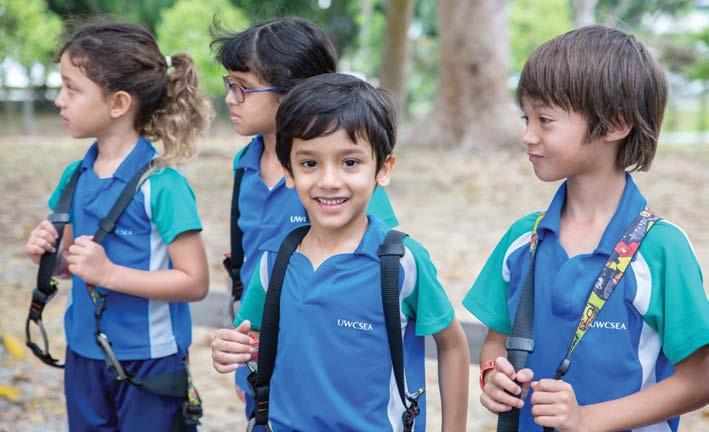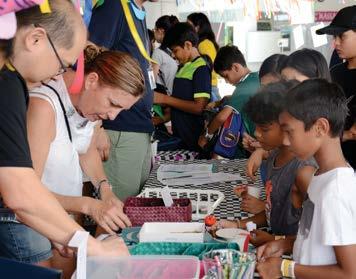
7 minute read
Personal and Social Education
LEARNING PROGRAMME: PERSONAL AND SOCIAL EDUCATION
The Personal and Social Education (PSE) programme helps to ensure that students feel secure and valued. In turn, this provides an effective base that encourages their learning, growth and social development. PSE underpins our entire programme, and is informed by both our mission and our Singapore context. It supports our international student community so that they feel truly valued by the adults who are leading their learning. The intent is so that they can continue to grow in self awareness, gaining an understanding of themselves and how they interact with those around them so as to develop effective and open-minded responses to personal and cultural differences. Time is dedicated each week for the intentional delivery of this important part of the student experience. However, student welfare is not limited to the allocated PSE time with their classroom teacher/mentor. Student welfare is also encompassed by safeguarding, learning support, wellness centre and counselling support, university advising, Heads of Grade and Vice Principals in supporting social and emotional needs of students. While all members of staff have a responsibility for the well-being of students, the learning support and wellness/counselling teams are central and work closely with teachers to ensure that students are supported both within and outside of the classroom. Broadly, the PSE curriculum content is classified in three overarching concepts: • individual wellbeing • relationships and community (interpersonal) wellbeing • student ability to engage with global issues (global wellbeing)
During the 2018/2019 year, the rationale and standards for the PSE curriculum from K1 to Grade 12 were refined. As part of our PSE curriculum, these concepts are revisited each year with students, in a spiral structure which is designed to build on the understanding and skills of students at age-appropriate developmental levels.
STRATEGIC DEVELOPMENT: SAFEGUARDING At UWCSEA we define safeguarding as the proactive measures that we take to protect our students from maltreatment; to prevent impairment to their health and development; ensuring they are able to grow up with the provision of safe and effective care; and taking action to enable all children to have the best outcomes (Keeping Children Safe in Education, 2019). This creates the conditions that underpin the effective delivery of our PSE curriculum.
Safe Behaviours curriculum The 2018/2019 saw the development and integration of Safe Behaviours learning as part of the College’s PSE curriculum. As part of our PSE Strands on Personal Safety, Digital Safety, and Healthy Relationships, elements of the Keeping Safe: Child Protection Curriculum have been modified for our unique school and national context and added to our programme. This world-class, evidence-based child safety programme, developed by the South Australian Department of Education, is used by a number of international schools around the world. Adapted after careful review of available resources, it provides UWCSEA with a robust international benchmark for safeguarding learning.
Embedding policies and training During 2018/2019, the role of designated safeguarding leads was embedded across the College and all school sections. As a result, students were able to identify a number of adults who they were able to approach should they have a concern for themselves or another member of the community. ‘Who Can I Talk To’ communications (posters, web pages, notices etc) were highlighted to students, outlining a number of specially trained adults that students could approach in addition to their mentor/ classroom teacher.
Across the College, the continued development of capacity in safeguarding and child protection included training identifying and responding to child protection concerns. The College also began implementation of systematic professional safeguarding training for safeguarding leads, school leadership, teaching and non-teaching staff, and began plans to extend this to volunteers following feedback.
STRATEGIC DEVELOPMENT: UWCSEA CULTURE OF CARE AND WELLBEING PRINCIPLES During the 2018/2019 year the Learning Leadership Team developed a shared statement setting out the College’s aspiration to develop a culture of care and wellbeing for the benefit of all in our community. These wellbeing principles acknowledge the complex interplay of individual feelings of wellbeing that can change over the annual cycle of the school year as individuals look to fulfill varied responsibilities across the matrix of all five elements in our learning programme.
The statement recognises that there is a shared commitment between all members of the community to cultivate wellbeing, and sets out the College’s responsibility for providing the conditions for community wellbeing to flourish—for students, staff and parents alike.
Three particular states or feelings were identified that contribute to overall wellbeing for individuals. These are: 1. Connected: We feel connected when we feel known by others, heard by other and cared for by others. 2.Autonomous: We feel autonomous when we are trusted to make our own decisions according to what is best for our own wellbeing, as well as that of others, and when we have time to reflect on our own perspective and actions. 3.Competent: We feel competent when we have opportunities to play to our strengths and are able to meet the demands made on us, confident that we have the resources to cope and be effective. In order to support the whole community to feel connected, autonomous and competent, the UWCSEA Culture of Care and Wellbeing outlines the following actions: • We build strong, trusting relationships that celebrate a diversity of perspectives • We unite around our shared common purpose ie the UWCSEA Mission and the welfare of young people • We empower everyone to make choices regarding their own individual wellbeing and we pro-actively support those who are struggling • We ensure that people have time to reflect and build self-awareness around their actions and choices • We support everyone in their individual personal and professional growth through our learning programme • We design systems that support and, where possible, simplify demands on individuals
STORIES UWCSEA

Personal and Social Education in action
The College’s strategic commitment to wellbeing is woven throughout the five elements of our learning programme. A strong central pillar of this is the focus on enhancing personal growth and resilience of our students and our school community. Whether this is done through the PSE curriculum, via individualised counselling and peer support, or through awareness-building events and activities that the College participates in or initiates, its effects ripple out to our students, staff and parents.
Each year, the PSE curriculum revisits topics at relevant points of the year, with the aim to build on the understanding and skills of the previous year. In this case study, a Dover Campus High School student highlights elements of their individual journey through the PSE programme, describing how their understanding has grown over time.
ASKING FOR HELP By Hanmin Lee, now Grade 12, Dover Campus
The first time I remember hearing the words ‘mental health’ in a classroom was in Grade 7. My Life Skills teacher taught us that, just as we’d see a doctor for colds or use plasters for cuts, it was important to care for our mental wellbeing. As my 13-yearold self did with most things, I assumed I was still years away from having to worry about it. High School came, however, which was when I began noticing more and more people around me feeling strained. For some of them, it seemed like they had entirely forgotten what it was like to be themselves. That point also came to me a few years ago. I felt plagued with emptiness and a sense of complete disconnection from everything around me. There wasn’t a concrete reason for me to feel this way—I had great teachers, financial security, friends and family. But for some reason, an intangible something left a gaping hole inside me. I always knew help was there for me, but I decided that staying silent was the best option.
It was overwhelming trying to hold in everything. I think the reason so many of us try to keep things in is that, at some point, we assume we’ve lost our merit to ask for help. Only when I broke my silence and reached out for help did I start to piece together what was actually going on was going on in my head. By having conversations with the people around me, I realised that my perception of mental health couldn’t have been more wrong. I found that ‘me too’ were the most comforting words in the world, and the more ‘me too’s I heard, the less reserved I became. I’ve taken a more active stance on mental health over the past few months, and I’ve been surprised at just how many people have had a story to share. I’ve noticed that, in an odd way, mental illness is like the clubs we have in school—you don’t really pay attention to who’s there at first, but take a closer look and you’ll be surprised to find even the most unexpected people as members. Anyone can join, regardless of where they’re from or how old they are. This ‘mental health soc’ has a catch though—every single member is tricked into thinking that they’re the only member, no matter how many of us there really are.
We’re all a part of the same, wider community. I’m sharing this for the sake of my past self, the people who have shared their experiences with me, and those who find themselves struggling right now—let’s work towards an open community, where our actions are driven by compassion and acceptance.







